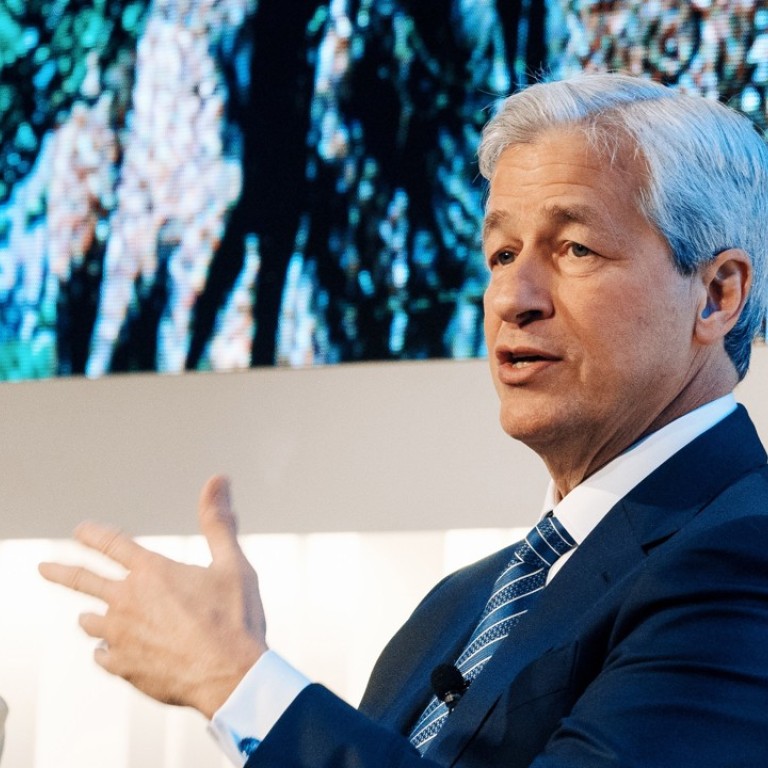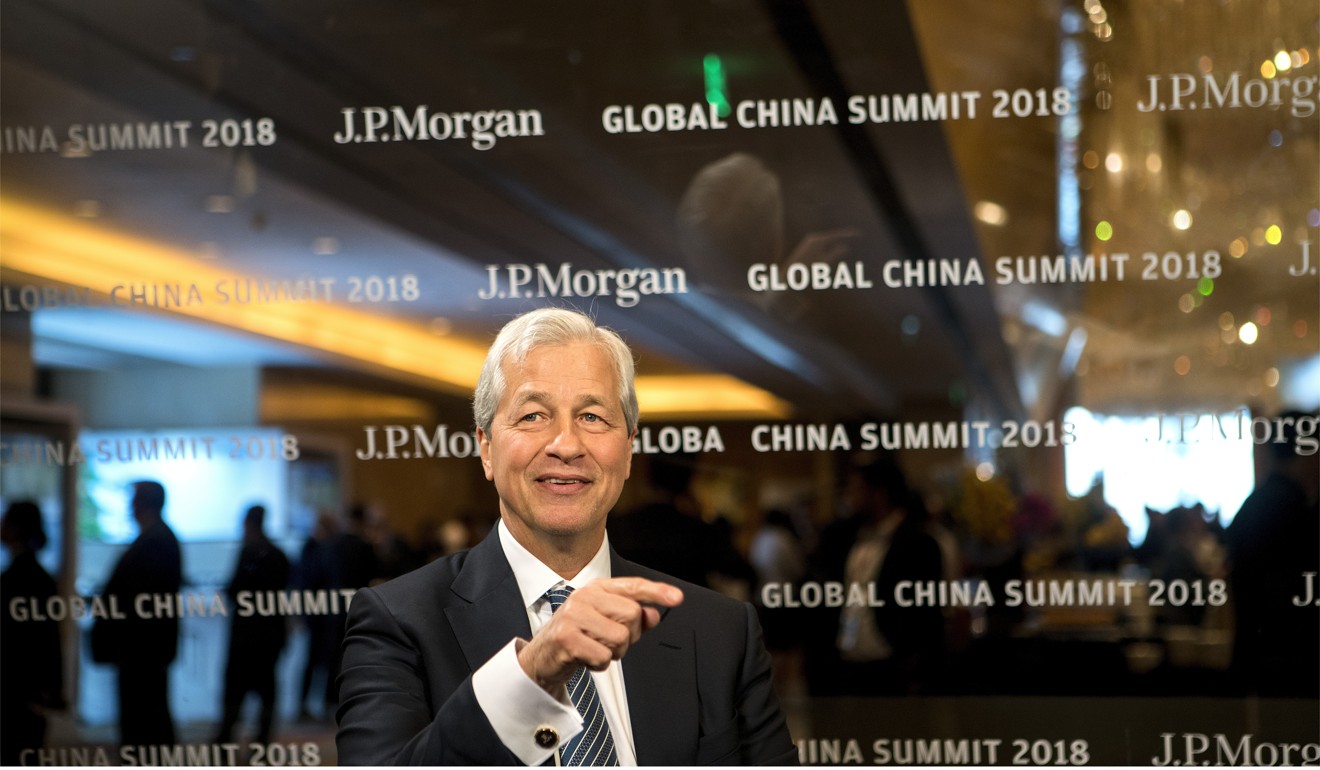
US-China trade war: talking is the way to a solution, says JPMorgan chief Jamie Dimon
Progress needs to be made, and there is now an opportunity for dialogue to prevent the dispute getting any worse, the top banker says
The United States and China should seize the opportunity in their ongoing trade crisis to build the capacity for a better relationship and dialogue, according to the chief of America’s largest bank and a former business council adviser to the US president.
The two countries have become embroiled in an increasingly acrimonious series of tit-for-tat threats and retributions as the US, taking China to task for a record US$375 billion trade surplus last year in China’s favour, proposed 25 per cent tariffs on US$50 billion worth of Chinese imports, prompting similar duties by Beijing on US imports such as soybeans, aircraft and cars.
In the balance is US$636 billion of annual commerce between the world’s two largest economies, with spillover effects that threaten global markets, peace and stability.
“Trade is becoming an issue, we want it resolved. The best way is through conversations,” said Jamie Dimon, chairman and chief executive of JPMorgan Chase, during the bank’s annual global China summit in Beijing.
“There are serious issues, the president has raised them. There are IT, equity ownership, some tariffs, certain regulatory barriers that go both ways. Get a trade person to sit down, listen, make a list, get details, do it again, and resolve it,” Dimon said.
Both sides have attempted talks on their grievances. Last week, a quartet of the US administration’s most ardent trade hawks – led by Commerce Secretary Wilbur Ross – left Beijing empty-handed after two days of unfruitful negotiations. Chinese vice-premier Liu He meanwhile is preparing to set off next week for trade negotiations in Washington.
The US delegation had asked China to cut its trade surplus by at least US$200 billion by 2020, while Beijing in return issued a series of demands, including asking the US to end its investigation of Chinese intellectual property practices.
“They’re just getting to know each other,” Dimon said separately in a Bloomberg Television interview. “They laid down what they want. The American side has laid down what they want. And that’s how you start a conversation. Now they’re working out the specific things. Hopefully they’ll make progress. We need progress to be made.”

Chinese commentators meanwhile said that Beijing should respond with more engagement with the US to reach a consensus, rather than drastic measures such as devaluing its currency or selling down its US debt holdings, an option some in China had pushed for.
“That is not sensible, there are no benefits [in doing so],” said Huang Yiping, professor and deputy dean of the National School of Development at Peking University, on the sidelines of the JPMorgan summit.
“If you have trillions in US bonds, it’s not like you can just sell them off overnight,” said Huang, who is also a member of the central bank of China’s advisory committee. “If you did and it caused the price of US bonds to plunge, you’d have hurt yourself.”
Others noted that the US’ more diversified economy would be less affected than China’s, a developing economy, in the event of a full-blown trade war. According to estimates by French bank Societe Generale, the proposed tariffs on US$50 billion worth of goods would affect 0.3 per cent of China’s gross domestic product (GDP), and total exposure to US final demand is about 3 per cent of its GDP.
If the tariffs were extended to US$150 billion worth of goods, as President Donald Trump has threatened, the damage to China’s economy could begin to matter. And that would make talks more urgent.
The two governments did have a decade-old dialogue mechanism, now known as the Strategic & Economic Dialogue (S&EC), involving the highest levels of government, under which talks used to take place twice a year. It was suspended last year amid rising trade tensions between the two countries.
Trump was moved to turn the threats and rhetoric from his presidential election trail into reality because “there had been too much talk, with no action” to cut the US trade deficit with China in a meaningful way, his former chief of staff Reince Priebus said during a March interview in Hong Kong.
That may be a knot that needs the direct intervention of Trump and Xi to untie. The American president had boasted of his “great relationship with Chinese President Xi Jinping,” and that the two men “respect each other and talk to each other.”
That is an opportunity that could be used to “set better standards for inter-government relationships,” Dimon said. “Maybe we can establish a better relationship in total between the United States and China, which will be better for the rest of the world,” he said.
Dimon was invited in December 2016 to join Trump’s business advisory council, alongside Tesla founder Elon Musk and Disney chief executive Bob Iger. The council was disbanded in August last year after several advisers departed, in the wake of incendiary tweets by Trump.
“China should be sensible about it,” said Jia Kang, chief economist at China Academy of New Supply Side Economics, and a former head of the research institute at the Ministry of Finance.
“Compromise should come from both sides. It can’t be just China. It’s something that needs to be negotiated.”
China has already offered concessions in the form of lifting foreign ownership caps in the country’s financial services industry from 49 per cent to 51 per cent effective June 30, which will gradually pave the way for foreign banks like JPMorgan to operate wholly owned units in China.
“What we want is simple: 100 per cent control like we have in the United States,” Dimon said in the Bloomberg interview. “I think it’s better for China. A lot of joint ventures are not very successful.
“Once we have 51 per cent, and then 100 per cent, you’ll have the full JPMorgan available to you; trade, credit, capital, product, services. Multinationals from around the world will come here and we can bring Chinese multinationals outside,” he said.


